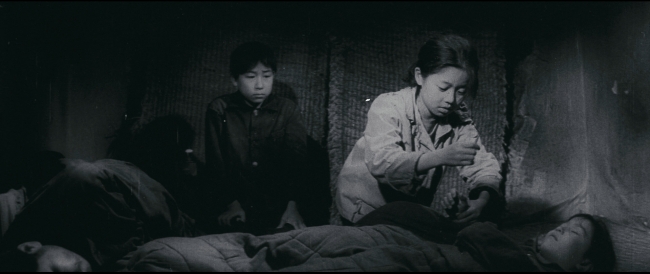The Korean Film Archive has rediscovered the original reel of a popular film from the 1960s based on a real-life diary kept by a child from an impoverished household.
The film, titled “Sorrow Even Up in Heaven,” enjoyed enormous popularity when it was released in theaters in 1965, drawing 285,000 viewers in Seoul alone. It is the highest-grossing black-and-white Korean film of all time, according to KOFA.
Despite its box-office success, the film went missing along with many others produced before the establishment of KOFA in 1974. The state-run organization began inquiring about the whereabouts of the movie in 2004 after learning that it had been exported to Taiwan in the 1960s.
 |
A scene from “Sorrow Even Up in Heaven.” (KOFA) |
It was scholar and filmmaker Kim So-young, currently teaching at Korea National University of Arts, who discovered the film. She spotted it in the Chinese Taipei Film Archive while doing research from 2013 to 2014. The film had been archived and mislabeled as a Chinese film at the institution, according to KOFA.
The tearjerker is based on a best-selling book written by a then-fifth-grader named Lee Yoon-bok, who was attending Myeongdeok Elementary School in Daegu at the time. The book, which consisted of Lee’s diary entries about his family’s economic difficulties and his mother, who left his abusive and ill father, was published by his teacher. While waiting for his mother to return, Lee had to sell gum with his 8-year-old younger sister at the Daegu train station to support his father and other siblings.
Renowned filmmaker Lee Chang-dong (“Secret Sunshine,” “Poetry”) was Lee Yoon-bok’s classmate at the elementary school in Daegu, and appears as a child actor in the film.
After Lee’s book became a national best seller, his mother reportedly returned to the family. Lee later worked at a pharmaceutical and chemical company and had two children with his wife. He died of hepatitis in 1990 at the age of 38.
“The film realistically portrays people’s lives in a period when most of them lived a hard life to escape from poverty,” KOFA said in a statement. “The film is also a great record of what Daegu was like in the 1960s, as it was shot in the city.”
KOFA said it will hold a public screening of the film in May to celebrate the institute’s 40th anniversary.
By Claire Lee (
dyc@heraldcorp.com)








![[From the Scene] At this Starbucks, you need ID: Franchise opens store with view of North Korea](http://res.heraldm.com/phpwas/restmb_idxmake.php?idx=644&simg=/content/image/2024/11/29/20241129050068_0.jpg)